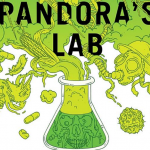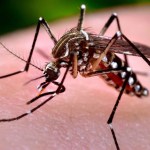DDT
What, with all the attacks on science and scientist these days, we may not want to be focusing on those times when science goes off the rails and makes a huge mess of things. But, science at its best and scientists at their best, will never shy away from such things.
Dr. Paul Offit just wrote a book called Pandora's Lab: Seven Stories of Science Gone Wrong, which not about an evil black dog that escaped from a box, but rather, seven instances when the march of scientific progress headed off a cliff rather than in the desired direction. People died. Many people died. Other bad things…
Scientists working to understand the implications of Zika's new prevalence in the Americas have found strong evidence that infection with the virus can cause fetal abnormalities and even miscarriage in pregnant women. On The Pump Handle, Liz Borkowski examines a series of studies conducted on Zika, including one which found the virus infected "most of the cortical neuron progenitors, which form the brain’s cortex" more quickly than other types of stem cell. This may be how the virus causes microcephaly, a birth defect resulting from abnormal brain development in the womb. On Discovering…
If there's one thing I've learned over the last decade-plus of blogging about medicine and alternative medicine, it's that any time there is an outbreak or pandemic of infectious disease, there will inevitably follow major conspiracy theories about it. It happened during the H1N1 pandemic in the 2009-2010 influenza season, the Ebola outbreak in late 2014, and the Disneyland measles outbreak last year, when cranks of many stripes claimed that either the outbreaks themselves were due to conspiracies (usually, but not limited to, conspiracies to promote the "depopulation" vaccination agenda of—…
Last week, I wrote about how conspiracy theories have been flowing fast and furious about the Zika virus and microcephaly. Even if you didn't see that post (perhaps instead having seen this one), you've probably seen the news reports describing how last fall the observation of a large number of cases of microcephaly, characterized by an abnormally small head and delayed brain development, in Brazil led researchers investigating the problem to suspect a link to a virus. That virus, the Zika virus, as you recall, is a mosquito-borne flavivirus related to dengue virus and transmitted primarily…
Yale Environment 360 has damaged its credibility by publishing a piece by Fred Pearce claiming:
When Rachel Carson’s sound case against the mass application of DDT as an agricultural pesticide morphed into blanket opposition to much smaller indoor applications to fight malaria, it arguably resulted in millions of deaths as the diseases resurged.
But the public health use of DDT was not banned. Look at the graph below (from Nature Vol 294 26 November 1981 page 302) plotting DDT usage against malaria cases in India during the malaria resurgence in the 70s.
It is arguable whether the increased…
In this piece Roger Bate, Donald Roberts and Richard Tren accuse the UN of "Scientific Fraud against DDT". Their Accusation is based on an Opinion paper by Roberts and Tren published in Research and Reports in Tropical Medicine. So let's look at their paper and see where the "Scientific Fraud" is.
Roberts and Tren's key argument is that reductions in malaria in the Americas were not the result of Global Environmental Facility interventions but were caused by increased use of antimalarial drugs. In their own words:
"However, their successes were not a
result of the interventions we describe…
With Donald Roberts about to give testimony before Congress it is instructive to look at his Senate testimony on October 6, 2004.
Just as the use of DDT in house spraying brought spectacular reductions in malaria,
declining use of house spraying brought spectacular increases in malaria. ... Data from Asian countries show similar
relationships. Figures 2-5 contrast malaria rates in recent years with the years when DDT was
used. The data represent annual parasite indexes (a population-based index of malaria
prevalence) during the period from 1995-99 compared with identical data from 1965-69.…
Merry Christmas to all my readers. Enjoy this 1946 ad for DDT -- you can put it everywhere!
In part 1 of this fact check I examined Brian Dunning's assertions that DDT did not thin eggshells. Responses from Orac: "Dunning should know better", Bug Girl: "Dunning clearly got his information second-hand. And it was bad information.", and Dunning:
I think I've repeated that Milloy was not one of my sources enough times. I hadn't even heard of him.
which is a rather odd thing to say, because in comments on his podcast Dunning responded to this comment:
Yeah, the very fact that you would consider Junk Science a source worthy of citing frankly is enough to treat the entire article with…
Brian Dunning's Skeptoid does an excellent job of debunking pseudoscience, so his podcast on DDT is profoundly disappointing. Dunning claims that DDT use did not have a large impact on bird populations, that elitist environmental groups were killing brown children by blocking DDT use and that DDT is effective even if mosquitoes are resistant. None of these claims are true, as I will detail in this post. But first, why did a sensible fellow like Dunning get it all so badly wrong? Well, his primary source for information about DDT was Steve Milloy's junkscience.com. One commenter…
In an earlier post
So George Monbiot challenged Brand to notice and announce that he's wrong about DDT. So far it hasn't happened. Unless it does, I think we should be skeptical about the rest of Brand's thesis.
Well, as Monbiot relates, it still hasn't happened. It seems increasingly likely that Brand will destroy his own credibility rather than admit to a significant error.
Following in the footsteps of The Great Global Warming Swindle Channel 4 has produced a new documentary that also appears to favour being controversial over being accurate or fair: What the Green Movement Got Wrong.
Adam Werbach who was in the documentary protested that his views were misrepresented and tried to have his contribution removed. He writes:
In one scene they interspersed heart-wrenching photos of starving children in Zambia, their emaciated mouths crying out for help, with a story of how the environmental movement blocked the delivery of food aid to Zambia from the United States…
Andrew Bolt accepts the results of a study published in The Lancet that used random sampling to estimate deaths and came up with a figure of 200,000 per year, about ten times the number you get from a direct count. Actually, there are two studies that fit my description, one on deaths from malaria in India, and another on war-related deaths in Iraq and Bolt only accepts the one that suits his beliefs -- deaths from malaria, so he can falsely accuse Rachel Carson of causing them.
Now, the studies differed in several ways, so it's possible that someone could have good reasons to reject one and…
Ed Darrell points to a WUWT post by Indur Goklany which promotes the use of DDT to fight malaria instead of more effective measures. As with most of the DDT promoters, Goklany carefully avoids mentioning the way mosquitoes evolve resistance to insecticides. For example, here's what he has on Sri Lanka:
For instance, malaria incidences in Sri Lanka (Ceylon) dropped from 2.8 million in the 1940s to less than 20 in 1963 (WHO 1999a, Whelan 1992). DDT spraying was stopped in 1964, and by 1969 the number of cases had grown to 2.5 million.
Now compare this with what really happened in Sri Lanka:…
tags: Following The Mercury Trail, health, environment, ecology, pollution, PCBs, DDT, heavy metals, red tide, human sewage pollution, Stephen Palumbi, TEDTalks, TED Talks, streaming video
There's a tight and surprising link between the ocean's health and ours, says marine biologist Stephen Palumbi. He shows how toxins at the bottom of the ocean food chain find their way into our bodies, with a shocking story of toxic contamination from a Japanese fish market. His work points a way forward for saving the oceans' health -- and humanity's.
TEDTalks is a daily video podcast of the best talks…
Mark Pendergrast writes: To kick off this book club discussion of Inside the Outbreaks, I thought I would explain briefly how I came to write the book and then suggest some possible topics for discussion.
The origin of the book goes back to an email I got in 2004 from my old high school and college friend, Andy Vernon, who wrote that I should consider writing the history of the EIS. I emailed back to say that I was honored, but what was the EIS? I had never heard of it. I knew Andy worked on tuberculosis at the CDC, but I didn't know that he had been a state-based EIS officer from 1978…
Ed Darrell has been looking at what Africa Fighting Malaria spends its money on:
Looking at the IRS Form 990s for the organization from 2003 through 2008 (which is organized in both the U.S. and South Africa), it seems to me that the major purpose of AFM is to pay Roger Bate about $100,000 a year for part of the time, and pay Richard Tren more than $80,000 a year for the rest of the time.
Can anyone tell me, what has Africa Fighting Malaria ever done to seriously fight malaria?
One could make the argument that if you sent $10 to Nothing But Nets, you've saved more lives than the last $1…
Bill Brown, who was a District Commissioner in pre-independence Papua New Guinea reviews a memoir from Michael O'Connor who was a patrol officer then:
OâConnor rails against the âclever people ⦠those academics, bureaucrats and others drawn from their experience of a sophisticated metropolitan societyâ.
The clever people âdecided that DDT should not be used because birds might die. So the program was abandoned, malaria returned in full force and people died as a result ... the malarial control program that involved spraying every hut and house with DDTâ.
In fact, the program…
Paul "Magic Water" Sheehan offers a "counter perspective" to Monckton's big lie that environmentalists killed 40 million people by banning DDT:
The claim that millions have lost their lives as a result of the withdrawal of DDT is hotly contested among scientists. Speculation over the number of deaths caused by the withdrawal of DDT ranges from thousands to tens of millions.
Yes, his counter perspective is just a smaller lie. Anyone interested in the truth can easily discover that the anti-malarial use of DDT has never been banned, and that by slowing the evolution of resistance, the ban on…
The Tyee has published an extract from a book by Donald Gutstein on corporate propaganda in Canada:
In the years since the Stockholm Treaty was signed, readers of Canadian newspapers have not had an opportunity for Greenpeace's position on DDT to be explained to them by Greenpeace itself. The only information they received about this environmental organization's position on DDT was conveyed by the organization's foes.
National Post readers learned, for instance, courtesy of then columnist Elizabeth Nickson, that "groups like Greenpeace... serve their own ideological agenda, and want to keep…



